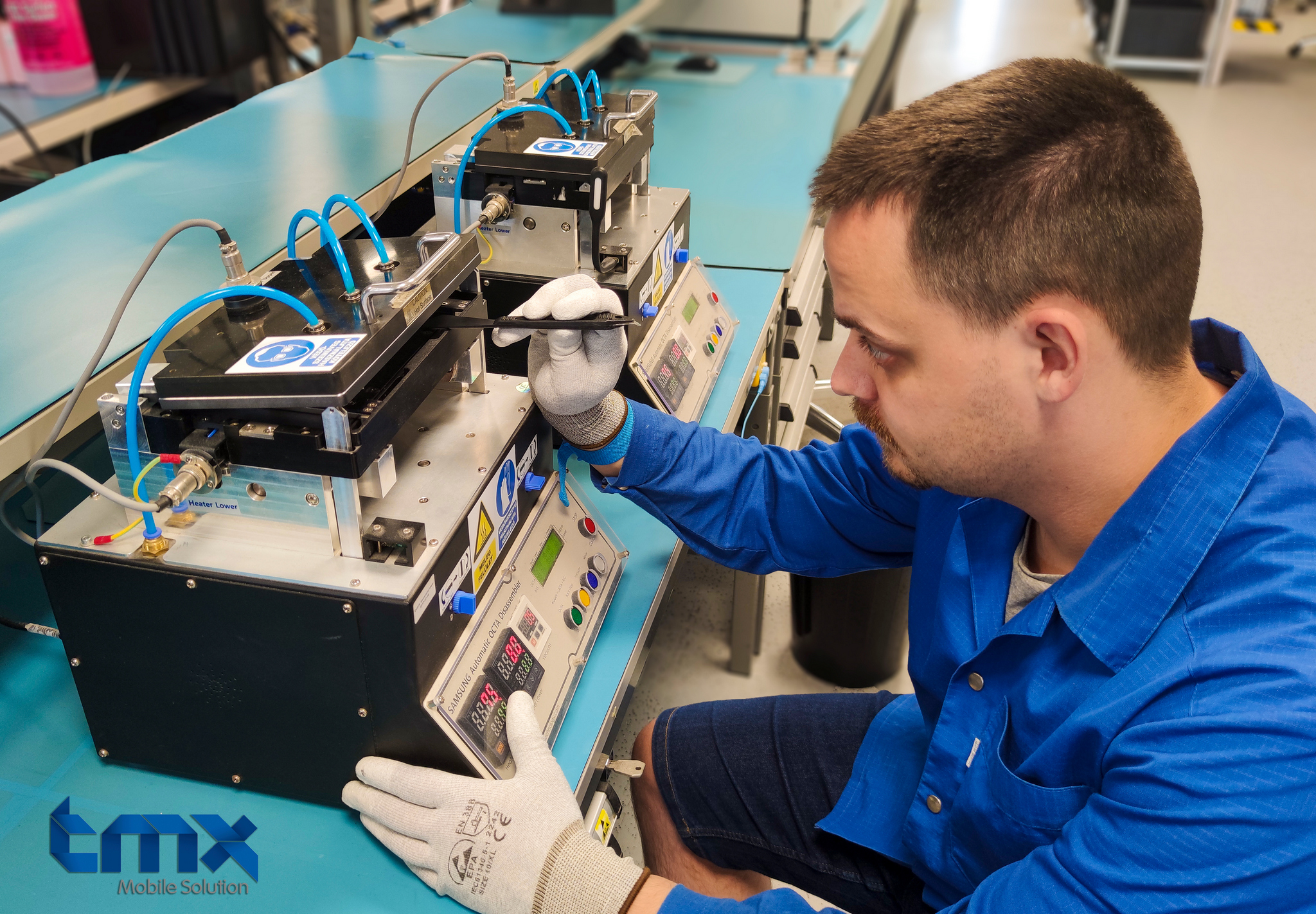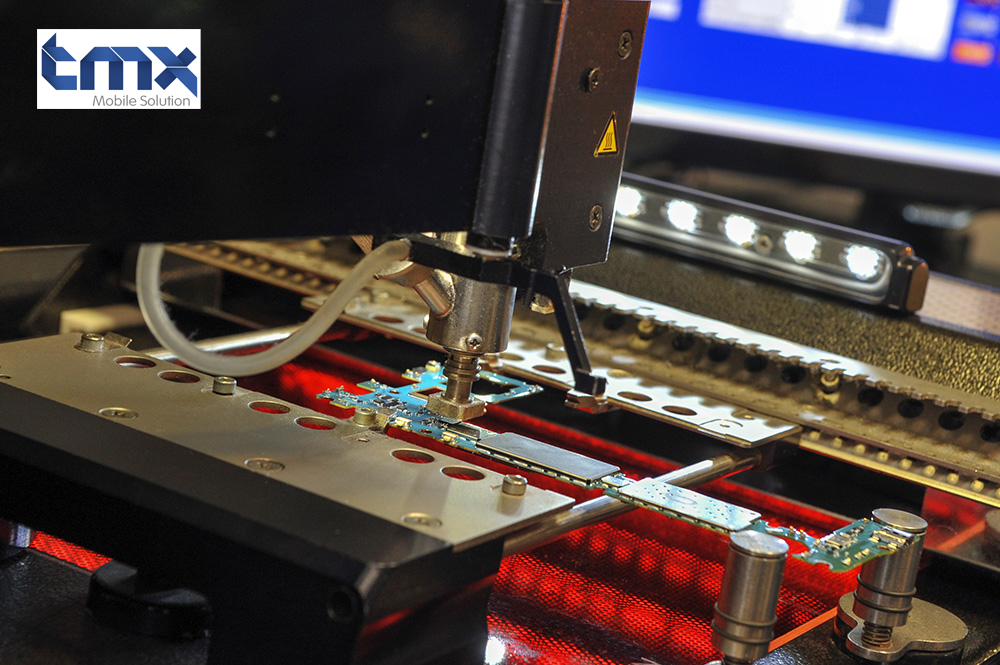How AI will Influence the After Sales in Circular Economy
By Dennis Dahrendorff , TMX Mobile Solution Szerviz Kft.
Introduction
In today's rapidly evolving world, the spotlight on sustainability is brighter than ever before. The circular economy, with its emphasis on reusing, recycling, and reducing waste, emerges as a promising solution to many of our environmental challenges. This innovative model is redefining the way we think about production, consumption, and the end-of-life management of products. Central to this sustainable approach is the vital role played by after-sales repairs.
By focusing on repairing and maintaining products, we can significantly extend their lifespans, leading to a substantial reduction in waste and resource consumption. For those who are deeply committed to spearheading sustainability initiatives, TMX Mobile Solution is a trailblazer. Our dedication and leadership in this domain underscore the potential of integrating sustainable practices into our daily lives and business operations. By championing such initiatives, we are not only contributing to a greener planet but also inspiring others to join the movement towards a more sustainable future.
Historical Perspective
Over the past two decades, the after-sales repair industry has transformed dramatically. Initially dominated by manual processes and human expertise, it now seamlessly incorporates digital tools. This shift was driven by continuous innovations addressing evolving challenges. A significant challenge was the swift technological advancements. As devices grew more intricate, repair methods had to adapt. Consumers, with technology integrated into their daily lives, began expecting faster and high-quality services. Long repair wait times became unacceptable.
The 21st century also spotlighted environmental issues, with a surge in electronic waste. Discarded devices, often due to minor issues or the appeal of newer versions, accumulated in landfills, emphasizing the need for efficient repair and recycling. Repairing became not just about convenience but an environmental necessity.
TMX Mobile Solution emerged as a leader, viewing challenges as growth opportunities. We adopted a comprehensive approach, considering both technical and societal impacts. As electronics became omnipresent, the demand for top-tier after-sales service surged. The industry responded by enhancing training, standardizing repair methods, and emphasizing customer experience, with features like faster services and transparent pricing.
In summary, the evolution of the after-sales repair sector showcases its adaptability and innovation. We exemplify this progress, championing a sustainable and customer-centric approach.
The Rise of AI in After-Sales
Over the last decade, Artificial Intelligence (AI) has transitioned from science fiction to a pivotal role in various industries. Initially met with skepticism, its real-world applications soon became evident. In diagnostics, AI showcased its potential by offering speed and accuracy, outpacing traditional methods prone to human error. Predictive maintenance evolved with AI's ability to foresee device or machinery failures, leading to proactive actions, reduced downtime, and extended device lifespans.
AI also revolutionized customer service. Chatbots like Chat GPT or Claude, equipped with natural language processing, began addressing customer queries efficiently, offering a 24/7 responsive experience, enhancing customer satisfaction. However, AI's integration faced challenges. Concerns arose about system glitches, potential job losses, and ethical implications. But as AI systems refined and evolved, they began augmenting rather than replacing human expertise. Technicians leveraged AI for repetitive tasks, focusing on intricate issues, and industries recognized AI's complementary role to human skills.
In summary, AI's journey over the past decade has been transformative, demonstrating the boundless potential when technology and human expertise merge.
Current Applications of AI
In today's tech-driven world, Artificial Intelligence (AI) has become pivotal, particularly in after-sales repairs. AI has transformed the once manual process of device diagnostics and repair, enhancing efficiency and accuracy. A key AI contribution is predictive algorithms, which analyze device data to forecast potential failures. This allows for proactive interventions, reducing downtime and prolonging device life.
AI's diagnostic tools have further refined the repair process. Unlike past reliance on technician expertise, AI tools quickly identify and suggest optimal repair strategies based on device specifics. Additionally, AI-driven chatbots now offer real-time customer assistance, handling basic troubleshooting and reducing the need for in-person visits. This streamlines customer service and allows technicians to tackle more intricate repairs.
Companies like TMX Mobile Solution exemplify AI's potential in after-sales services, showcasing its transformative impact from diagnosis to repair completion. In essence, AI's role in after-sales is transformative, ushering in unprecedented efficiency and precision. As AI continues to evolve, it's evident that it will lead the future of intelligent, automated repairs.
Benefits of Integrating AI
The adoption of Artificial Intelligence (AI) in various sectors is not just a technological advancement; it's a strategic investment that promises substantial financial returns. By streamlining operations, AI significantly reduces operational costs. For instance, in the electronics and machinery industries, AI-driven diagnostics and predictive maintenance eliminate the need for costly manual interventions and reduce downtimes. The result? Increased margins and enhanced profitability.
Furthermore, AI's ability to swiftly diagnose and rectify issues means fewer resources are spent on prolonged repairs and replacements. This speed and precision directly translate to cost savings, giving businesses a competitive edge in pricing and service offerings.
Sustainability, powered by AI, also has a direct economic impact. By minimizing waste through predictive analysis and emphasizing recycling, businesses can tap into the growing market of environmentally conscious consumers while also benefiting from cost savings in material reuse. This not only aligns with the principles of the circular economy but also positions businesses for financial growth in an eco-aware market.
Moreover, the enhanced customer experience driven by AI, from personalized recommendations to swift query resolutions, ensures customer retention and reduces the costs associated with acquiring new customers. In a competitive landscape, retaining a loyal customer base can significantly impact the bottom line. One software we have in use and can confirm brilliant results is Amplemarket.
In essence, AI is not just a technological marvel; it's a financial catalyst. Its integration leads to reduced operational costs, taps into new markets, and ensures increased margins. Businesses that leverage AI are not only future-proofing their operations but also ensuring a trajectory of sustained financial growth.
Challenges and Considerations
The integration of Artificial Intelligence (AI) into different business fields, while promising, is not devoid of hurdles. One of the most pressing issues is data privacy. In an age where personal information is increasingly valuable, many customers are understandably hesitant about sharing their device data. They fear potential misuse, breaches, or unauthorized access, which could compromise their personal and sensitive information. This apprehension is further fueled by high-profile data breaches in the news, making consumers more cautious than ever.
Another challenge lies in the technological infrastructure itself. Particularly in older repair setups or establishments that have been operating for years without significant technological upgrades, the integration of advanced AI systems can be daunting. These setups might lack the necessary hardware or software compatibility, making the adoption of AI not just challenging but also potentially expensive. Upgrading entire systems to accommodate AI can be a resource-intensive endeavor, and not all businesses might be willing or able to make such an investment.
Furthermore, there's a genuine concern about over-reliance on AI, to the detriment of human expertise. While AI can process data at unparalleled speeds and offer insights based on patterns, human intuition, experience, and judgment remain invaluable. There's a risk that overemphasizing AI could sideline human technicians, leading to a potential loss of the nuanced understanding and expertise they bring to the table. This could result in an over-dependence on technology, making businesses vulnerable if there are system failures or unforeseen AI limitations.
To navigate these challenges, a holistic strategy is essential. It's crucial to strike a balance between leveraging AI's capabilities and valuing human expertise. This means integrating AI in a manner that complements human skills rather than replacing them. Training programs can be implemented to help technicians work alongside AI tools, ensuring that they're not rendered obsolete but are instead equipped to harness the power of both AI and their own expertise. By adopting such a balanced approach, businesses can optimize the benefits of AI while mitigating its potential pitfalls.

Looking Ahead: The Future of AI in After-Sales
The future landscape is ripe with potential for AI-driven advancements that promise to redefine the way we approach various tasks and challenges. One of the most anticipated innovations lies in the realm of Augmented Reality (AR). This technology, which overlays digital information on the real world, has the potential to revolutionize the way technicians approach repairs. Imagine a scenario where technicians, equipped with AR glasses, receive real-time guidance and visual aids as they work on intricate devices. This not only speeds up the repair process but also ensures a higher degree of accuracy, minimizing the chances of errors.
Another exciting frontier is the application of deep learning in diagnostics. Deep learning, a subset of machine learning, can process vast amounts of data, identifying patterns and anomalies that might be missed by traditional diagnostic tools. This means that even the most subtle of issues in devices could be detected and addressed, ensuring that repairs are comprehensive and long-lasting. The precision that deep learning brings to the table could drastically reduce the need for repeat repairs, enhancing customer satisfaction and trust in after-sales services.
Furthermore, as AI technologies continue to mature and integrate more seamlessly into various industries, their impact on the after-sales repair sector is set to grow exponentially. The relationship between AI and this industry is becoming increasingly symbiotic. AI provides the tools and insights to optimize repairs, while the industry offers a vast repository of data and real-world scenarios that help refine and improve AI algorithms. This mutualistic relationship ensures that both entities benefit and evolve in tandem.
In the broader context, these advancements have significant implications for the circular economy. As devices are repaired with greater efficiency and precision, their lifespans are extended, reducing the need for frequent replacements. This not only conserves resources but also reduces electronic waste, aligning perfectly with the principles of sustainability and responsible consumption. With AI at the helm, the circular economy is poised to reach unprecedented levels of efficiency and sustainability, setting a benchmark for industries worldwide. The fusion of AI's capabilities with the goals of the circular economy promises a future where technology and sustainability coexist harmoniously, driving progress and prosperity.
Conclusion
The convergence of Artificial Intelligence (AI) and the circular economy is unlocking transformative opportunities, reshaping industries, and emphasizing sustainability. AI's predictive capabilities are modernizing the after-sales repair business. Instead of lengthy diagnostics, AI tools quickly pinpoint issues, suggest repairs, and forecast device failures, leading to efficient repairs and prolonged device life. This aligns with the circular economy's goals of maximizing product lifecycles and promoting recycling. Additionally, AI's integration offers enhanced customer services, including personalized recommendations and real-time support, eliminating long waits and ensuring clarity in repairs. Beyond repairs, AI's data analysis informs product design and supply chain optimization, emphasizing durability and recyclability. In sum, the blend of AI and the circular economy heralds a future where technology and sustainability coalesce, prioritizing product longevity and customer-centric services, steering towards a sustainable, customer-focused world.

 Dennis Dahrendorff
Dennis Dahrendorff Dennis Dahrendorff is the Vice President of Business Development at TMX Mobile Solution, bringing with him a wealth of experience from the after-sales and electronics sectors. Over the years, he has honed his expertise in logistics, project management, and strategic business development. Dennis has a notable track record in optimizing after-sales processes, leveraging extensive European partnerships, and ensuring exceptional service delivery. Additionally, he has founded ventures that capitalize on his deep knowledge in AI, robotics, and the synergy between humans and machines. Dennis's commitment to innovation and customer-centricity has been a driving force in his illustrious career.